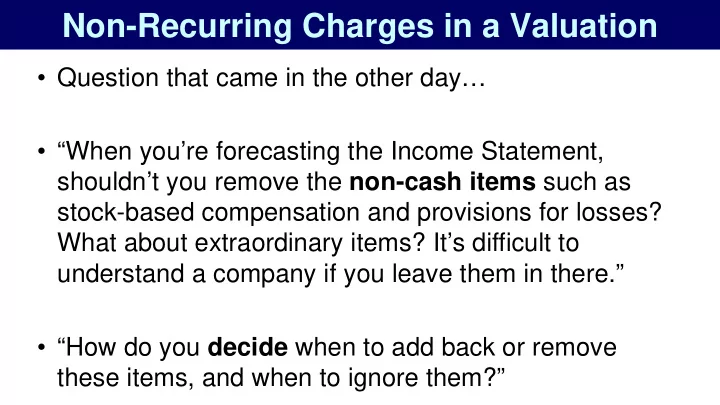

Non-Recurring Charges in a Valuation • Question that came in the other day… • “When you’re forecasting the Income Statement, shouldn’t you remove the non-cash items such as stock-based compensation and provisions for losses? What about extraordinary items? It’s difficult to understand a company if you leave them in there.” • “How do you decide when to add back or remove these items, and when to ignore them?”
Non-Recurring Charges in a Valuation • There is a TON of confusion about this topic: • Non-cash vs. non-recurring charges • How do you find non-recurring charges? • Add them back? Remove them? Ignore them? • Why do they even matter in the first place?
Why I Hate Non-Recurring Charges • Admission: I have a personal vendetta against non- recurring charges… • Excellent way to waste time when valuing companies – cruel and unusual punishment from senior bankers • Why: Non-recurring charges only impact the historical financials, and in a valuation you are mostly concerned with future estimates (in a DCF) and forward multiples (from the comparables)
Non-Recurring Charges 101: • Why do non-recurring charges matter? Historical financial statement analysis and metrics – might throw off the numbers • How do you find non-recurring charges? (Two solutions depending on the level of detail you need…) Quick IS and CFS analysis, and/or… Detailed review of the notes to the statements • Do you add them back or adjust in some way?
Why Do Non-Recurring Charges Matter? • Could throw off financial statement analysis and multiples such as EV / EBITDA in the historical period • EX: Company records a big write-down or a big Gain or Loss… is that item really representative of the company’s ongoing , recurring business activities? NO! • Example for Alcoa: The big Goodwill Impairment charge really throws things off in Year 2, so we should consider adjusting for it
Why Do Non-Recurring Charges Matter? • But… does this really matter for valuation / financial modeling / analytical purposes? • I would say, “No” because it’s not in the most recent period – and normally you focus on the LTM or Last Fiscal Year figures when calculating valuation multiples • So you care more about very recent or anticipated non- recurring charges
How Do You Find Non-Recurring Charges? • Easy Method: Look at the Income Statement and Cash Flow Statement and search for anything that might be “non-recurring,” i.e. it does not appear in every year • Does NOT matter whether an item is cash or non-cash – all that matters is whether or not it impacts the metric you are calculating, such as EBIT or EBITDA • Companies will often, though not always, list major non- recurring items on the IS and CFS
How Do You Find Non-Recurring Charges? • Alcoa: We are NOT adding back Restructuring because it’s effectively a recurring item • Alcoa: Not adding back Stock-Based Compensation, Provisions for Doubtful Accounts, etc. – yes, they’re non- cash, but they’re not non-recurring • Alcoa: What about Gains and Losses? And does anything else exist? Need to do some more detective work now… time permitting
How Do You Find Non-Recurring Charges? • Hardcore Method: Sift through the Notes to the Financial Statements if you have hours of time to spend • COGS: A few write-downs… but are they non-recurring? • Other Income: Gains from CFS appear there – so we don’t add these back – don’t impact EBIT or EBITDA • Restructuring: Could make the case that the Loss is non-recurring… but even that is debatable
Do You Add Back Non-Recurring Charges? • Historical Financial Statements: No – you only “add them back” in metrics like EBIT, EBIDA, and maybe “Pro- Forma” Net Income (but not getting into that here) • Criterion #1: Is it really non-recurring? Really ? HAS NOTHING TO DO WITH CASH VS. NON-CASH! • Criterion #2: Does it actually impact the metric you are adding it back to?
Non-Recurring Charges 101: • Why do non-recurring charges matter? Historical financial statement analysis and metrics – might throw off the numbers • How do you find non-recurring charges? Quick IS and CFS analysis, and/or… Detailed review of the notes to the statements • Add Back? Only if they’re non-recurring and “above-the- line” (i.e., they affect the metric you are calculating)
Recommend
More recommend